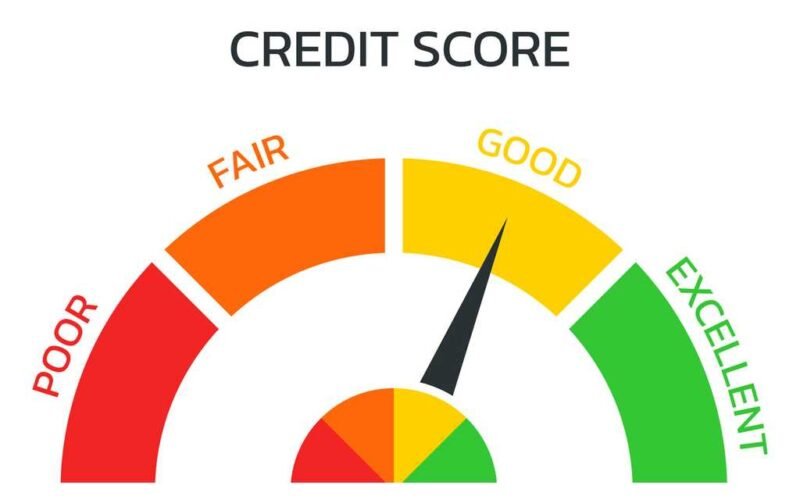Credit scores are a crucial aspect of modern-day finance that affects everything from loan approvals to credit card applications. Despite the importance of credit scores, many people remain unaware of what they are and how they work. Understanding credit scores is essential for anyone looking to navigate the complex world of personal finance effectively.
A credit score is a numerical representation of an individual's financial history and behavior that lenders use to assess their creditworthiness. It is based on a variety of factors such as payment history, length of credit history, and credit utilization.
Although it may seem like just another number, a good or bad credit score can have significant consequences on an individual's ability to obtain loans or access other forms of financing.
As such, having an in-depth understanding of how these scores are calculated is vital for making informed financial decisions.
READ ALSO: Setting Financial Goals – [Important Things You Should Know]
- What is a Credit Score?
- How are credit scores calculated?
- The Role of Payment History
- The Role of Credit Utilization
- The Role of Length of Credit History
- The Role of Types of Credit
- How to Check Your Credit Score
- Understanding Your Credit Report
- How to Dispute Errors on Your Credit Report
- Tips for Improving Your Credit Score
- Tips for Boasting Your Credit Rating
- Frequently Asked Questions
- Conclusion
What is a Credit Score?

A credit score is a numerical representation of an individual's creditworthiness, calculated based on their credit history and other financial behaviors. It ranges from 300 to 850, with a higher score indicating better creditworthiness.
The factors affecting the calculation of a credit score include payment history, amounts owed, length of credit history, new credits, and types of credits used.
Maintaining a good credit score is crucial as it affects an individual's ability to obtain loans or credits at favorable terms. Lenders use credit scores to assess the likelihood of borrowers repaying debts in full and on time.
A low credit score can lead to denied loan applications or high-interest rates that make borrowing more expensive. Therefore, it is essential to pay bills on time, keep balances low on revolving accounts like credit cards, and avoid opening too many new accounts simultaneously.
Understanding your credit score and how it impacts your financial health is vital for achieving long-term financial stability. By keeping track of your payment history and other financial behaviors that affect your score, you can take steps toward maintaining a good rating.
Remember that building good habits now will benefit you in the future when applying for loans or seeking other forms of financing.
READ ALSO: How To Find Legitimate Online Surveys
How are credit scores calculated?
Creditworthiness is determined by various factors, including payment history, credit utilization, length of credit history, types of credit used, and new credit inquiries. These factors are used to calculate a person's credit score.
Payment history is the most important factor when it comes to calculating a person's credit score. Late payments or missed payments can negatively impact a person's score significantly. On the other hand, consistent on-time payments can help improve one's score over time.
Credit utilization is another factor that plays a significant role in determining an individual's creditworthiness. It refers to the percentage of available credit that someone uses regularly compared to their total available limit.
The length of one's credit history also affects their overall score as it reflects how long one has been using and managing their accounts responsibly.
Types of accounts used such as revolving or installment loans and new inquiries into a person's credit report for new lines of credit applied for are other factors that may affect someone's overall rating.
Understanding these factors will help individuals take control over their finances and maintain good financial habits which will positively affect their scores in the long term.
The Role of Payment History
The impact of payment history on creditworthiness is paramount. The importance of timely payments cannot be overstated, as it is the most significant factor in determining someone's credit score.
Late or missed payments can have a significant impact on one's credit score and overall creditworthiness. One missed payment can drastically affect someone's overall score, especially if they have a history of late or missed payments.
Payment history makes up 35% of an individual's FICO score, which is why it is crucial to always make timely payments. A single late payment can stay on a person's credit report for up to seven years and cause their credit score to drop by as much as 100 points.
The negative effects of missed payments on credit scores are far-reaching and long-lasting, making it essential always to stay current with payment obligations. Creditors take into account the likelihood that borrowers will pay back loans based on their past behavior when making lending decisions.
As such, maintaining a good payment history helps improve one's chances of obtaining favorable terms for future loans and lines of credit.
The Role of Credit Utilization
Credit utilization is an essential factor in determining an individual's overall creditworthiness. It refers to the amount of credit a person uses compared to their total available credit limit. A high level of credit utilization indicates that an individual may be over-reliant on debt, which can negatively impact their credit score.
The role of credit utilization in calculating a person's credit score is significant. In fact, it accounts for approximately 30% of the FICO score and is considered one of the most critical factors. The lower the percentage of utilized credit, the better it reflects on an individual's ability to manage their finances responsibly.
Therefore, maintaining optimal credit usage by keeping balances low or paying them off entirely every month is crucial in building and maintaining a good credit history.
To better understand how much debt one should carry at any given time, here are some key points about the impact that credit utilization has on your overall financial health:
- High levels of unused revolving lines of credit can positively impact your score.
- Keeping balances below 30% percent or lower than your total available limits will help improve your rating.
- Credit card borrowing is not always negative as long as it's repaid within reasonable periods.
- Opening new lines of credit frequently can have adverse effects on your scores since they increase inquiries into your reports.
- Strive to keep old trading lines open even if you're no longer using them; this demonstrates stability and helps reduce overall debts owed.
Having a good understanding of how lenders perceive and calculate risks associated with lending money is critical for anyone seeking financing opportunities such as mortgages or personal loans. Credit utilization plays a vital role in determining whether someone qualifies for these types of transactions or not.
By maintaining optimal usage through responsible spending habits and wise use of available resources, individuals can build excellent financial reputations that will benefit them for years to come.
The Role of Length of Credit History
One significant factor that influences a person's ability to secure financing opportunities is the length of their credit history. Credit history length refers to how long an individual has been using credit and making payments on time. The longer the credit history, the more lenders can assess an individual's behavior over time and determine their creditworthiness.
The impact of credit history length on credit scores is significant. A shorter credit history can negatively affect one's score because lenders have less information to evaluate an individual's risk level.
Conversely, a longer credit history gives lenders more data to work with when assessing a borrower's financial habits. As such, it is essential for individuals looking to build their credit score to establish a positive payment pattern over time.
Credit score trends over time demonstrate the importance of maintaining good financial habits over many years. A long-standing record of paying bills on time shows consistency in meeting financial obligations, which improves one's overall credibility with lenders.
Therefore, even if there are negative events like missed payments or high balances in earlier years, these incidents will carry less weight as they move further into the past and eventually disappear from your report altogether after several years.
READ ALSO: Personal Finance Apps For Android
The Role of Types of Credit
Different types of financing options can impact an individual's creditworthiness. At a high level, there are two main types of credit: revolving and installment. Revolving credit refers to lines of credit that can be used repeatedly, such as credit cards or home equity lines of credit (HELOCs).
Installment credit, on the other hand, involves borrowing a set amount for a specific period of time with fixed payments until the loan is paid off, such as mortgages or auto loans.
The mix of different types of credit in one's portfolio can also have an impact on their overall credit score. A healthy mix might include both revolving and installment accounts because it shows a responsible ability to manage various forms of debt.
However, opening too many new accounts at once or closing old ones can negatively affect your score by shortening your average account age and increasing your utilization rate.
It's important to note that even though certain types of debt may weigh more heavily in scoring models than others, all debts should be managed responsibly in order to maintain good credit health. This includes making timely payments, keeping balances low relative to available credit limits, and avoiding delinquencies or defaults.
By understanding the role that different types of financing play in determining your overall creditworthiness, you can make informed decisions about how to manage your finances effectively.
How to Check Your Credit Score
Monitoring your financial health is essential, and one way to do so is by regularly checking your credit score. Credit score monitoring can help you keep track of important changes that may affect your ability to obtain credit or loans in the future.
There are several ways to check your credit score, including through free credit reports from each of the three major credit bureaus: Equifax, Experian, and TransUnion.
Here are three ways you can check your credit score:
Utilize free annual credit reports: Federal law mandates that each of the three major credit reporting agencies provide consumers with a free copy of their credit report annually upon request. This allows you to see what information lenders are using when determining whether or not to extend you a line of credit.
Sign up for a paid monitoring service: Many companies offer paid services that monitor your account for changes in activity and alert you if there is any suspicious activity on any of your accounts.
Use a free online tool: There are many websites available that allow consumers to check their scores for free without having to sign up for anything or pay any fees.
It's important to remember that regularly checking your credit score can help you catch errors and fraudulent activities early on, which could save you time and money in the long run.
By staying vigilant and taking proactive steps toward monitoring your financial well-being, you'll be better equipped to make informed decisions about managing debts and obtaining loans when needed.
Understanding Your Credit Report
Familiarizing oneself with the details of one's financial history can be a useful practice in managing one's overall economic standing. One essential aspect to consider is understanding your credit report, which contains all the information about your credit accounts and payment history.
Your credit report is maintained by various credit bureaus, which collect data from creditors, lenders, and other financial institutions you have interacted with over the years. It is crucial to monitor your credit report regularly since it influences several aspects of your financial life.
For instance, potential lenders use it to determine whether to approve or decline your loan applications and set interest rates for approved loans. Additionally, landlords may use it when deciding whether to offer you a lease agreement or not. Employers who require their employees to handle money may also look at credit reports as part of their hiring process.
Understanding your credit report and monitoring it regularly can positively impact your overall financial health. It helps you identify errors or fraudulent activities that could hurt your credit score and rectify them promptly.
By keeping an eye on this critical document, you stay informed about how well you manage debt repayment and build trust with potential lenders or employers in the future.
How to Dispute Errors on Your Credit Report
Rectifying errors on your credit report can be a frustrating process, but it is crucial to ensure the accuracy of your financial history and protect yourself from potential negative consequences.
Disputing inaccuracies on your credit report can help you avoid being denied loans or credit cards, paying higher interest rates, or even losing out on job opportunities.
It is estimated that about one in five consumers have an error on their credit report, highlighting the importance of regularly checking your report and disputing any mistakes.
To dispute credit report errors, start by obtaining a copy of your credit report from each of the three major credit bureaus: Equifax, Experian, and TransUnion. Carefully review each section of the reports to identify any mistakes such as incorrect personal information or accounts that do not belong to you.
Once you have identified an error with supporting documentation such as receipts or bank statements, you can submit a dispute letter to the respective bureau explaining the error and providing evidence.
It is important to note that disputing inaccuracies on your credit report may take some time and effort. The bureau will investigate the dispute by contacting the creditor who reported it within 30 days. If they find that there was indeed an error, they will update your credit report accordingly.
However, if they find no mistake was made, they will notify you in writing along with their reasoning for denying your dispute.
Despite this lengthy process, taking action to correct any discrepancies is worth it in order to maintain accurate records of your financial history and improve your overall credit score.
| Pros | Cons |
|---|---|
| Improved Credit Score | Time-consuming process |
| Lower Interest Rates | Stressful experience |
| Better Loan Opportunities | Potential fees associated with obtaining reports |
| Job Opportunities | No guarantee for successful disputes |
| Accurate Financial Records | A possible temporary dip in the score during the investigation period |
Tips for Improving Your Credit Score
Enhancing your financial reputation can be likened to a game of chess where strategic moves such as reducing debt and increasing credit limits can yield positive results in improving your overall creditworthiness.
Paying bills on time is a crucial factor in building and maintaining good credit scores. Late payments, even if it's just a day or two behind the deadline, can negatively affect your score. Therefore, it's important to prioritize bill payments and ensure that they are paid on time.
Another way to improve your credit score is through credit counseling. Credit counselors can help you create a budget plan that works for you and assist you in developing strategies to pay off debt faster.
They also provide education on how to manage finances effectively, including tips on managing debt and creating emergency funds. Working with a reputable credit counselor can potentially give you long-term benefits by helping you develop healthy financial habits.
In addition to paying bills on time and seeking help from professionals like credit counselors, there are other ways to boost your credit score.
These include keeping low balances on revolving accounts such as credit cards, avoiding opening too many new accounts at once, and monitoring your credit report regularly for any errors or fraudulent activities.
By taking these steps towards improving their financial reputation, individuals can increase their chances of being approved for loans or getting better interest rates when applying for credit products such as mortgages or car loans.
READ ALSO: Personal Finance Apps For Android
Tips for Boasting Your Credit Rating
Previously, we discussed some effective tips for improving your credit score. Now, let us delve deeper into this topic and explore more ways to boost your credit rating. Maintaining a good credit score is crucial as it can affect your ability to obtain loans or credit cards with favorable terms.
One of the most straightforward ways to improve your credit score is by paying bills on time consistently. Late payments can significantly impact your credit history and lower your score. To avoid this, set up automatic payments or reminders so that you never miss a payment deadline.
Another way to increase your creditworthiness is by seeking advice from a reputable credit counseling service. They can provide you with guidance on how to develop better financial habits and manage debt effectively.
Credit counseling services may also negotiate with creditors on behalf of their clients, which could result in reduced interest rates or waived fees.
In addition, here are five essential tips that you can use to improve your credit score:
Keep balances low: High balances on revolving accounts like credit cards can negatively affect your score.
Don't close old accounts: Closing old accounts shortens the length of your credit history, which can lead to a lower score.
Monitor Your Credit Report: Regularly review and dispute any errors on your report.
Limit New Applications for Credit: Applying for new lines of credit frequently indicates financial instability and lowers scores.
Diversify Your Credit Mix: A healthy mix of installment loans (e.g., car loans) and revolving accounts (e.g., credit cards) signals responsible borrowing behavior.
Maintaining a healthy credit history is crucial for obtaining favorable loan terms, and one way to achieve this is by implementing practical strategies.
Seeking advice from credit counseling services can help you understand your financial situation better and provide guidance on how to improve your credit score. These services offer debt management plans that can help you consolidate your debts into one manageable monthly payment.
Keeping balances low on revolving accounts is another important strategy that can help boost your credit score. The amount owed on revolving accounts, such as credit cards, makes up 30% of your FICO score, so it's essential to keep these balances as low as possible.
Avoiding closing old accounts also plays a significant role in maintaining a healthy credit history since long-standing accounts show lenders that you have a reliable payment history.
Monitoring your credit report for errors is crucial since mistakes on your report can negatively impact your credit score. You are entitled to one free copy of your report annually from each of the three major bureaus: Equifax, Experian, and TransUnion. Reviewing this information regularly ensures that there are no inaccuracies or fraudulent activities affecting your score.
Limiting new applications for credit and diversifying your credit mix are other ways to improve your overall creditworthiness. Improving one's credit score involves adopting practical strategies such as seeking advice from Credit Counseling Services and Debt Consolidation Programs.
Keeping balances low on revolving accounts, and avoiding closing old ones while monitoring the accuracy of reports should be taken seriously in order not to jeopardize obtaining favorable loan terms in future applications.
READ ALSO: Creative Side Hustles For Uk Residents
Frequently Asked Questions
What are some common mistakes people make that negatively impact their credit score?
Failing to make payments on time and utilizing too much credit are common mistakes that can negatively impact one's credit score.
Both factors heavily influence creditworthiness and should be closely monitored to maintain a favorable score.
How often are credit scores updated and when is the best time to check it?
Like a living organism, credit scores are in constant flux with updates happening monthly. It's best to check them regularly, but too many inquiries can have a negative impact on your score.
Can opening a new credit card or loan have a negative impact on your credit score?
Opening a new credit card or loan can have a negative impact on your credit score, as it increases your credit utilization ratio. It is important to make timely payments to avoid further damage to your score.
How long does it take to improve a bad credit score and what steps can someone take to do so?
Rebuilding a bad credit score can take months or even years depending on the severity of the damage. Ways to rebuild include paying bills on time, reducing debt, and seeking credit counseling.
Are there any alternative credit scoring methods that lenders may use besides FICO scores?
Alternative scoring models, such as VantageScore and TransUnion CreditVision, offer lenders different ways to evaluate creditworthiness.
Pros include increased accuracy and inclusion of previously unreported data, while cons include lack of widespread adoption and potential confusion for consumers.
Conclusion
Credit scores are crucial in determining an individual's financial stability and creditworthiness. These scores reflect a person's ability to handle credit responsibly, and they play a significant role in obtaining loans, mortgages, and other forms of credit.
Credit scores are calculated based on several factors, including payment history, credit utilization, and length of credit history. The payment history is the most critical factor in calculating a person's credit score.
Late payments or missed payments can significantly impact one's score negatively. Similarly, high levels of debt relative to available credit can lead to lower scores due to high credit utilization rates. Additionally, the length of time that a person has had active accounts plays a role in determining their score.
To improve one's credit score, individuals should focus on paying bills on time and keeping their debt-to-credit ratio low. They should also maintain active lines of credit for extended periods to establish a good track record with creditors. Additionally, seeking professional advice from financial advisors can help people develop strategies that will enable them to manage their finances better.
In conclusion, understanding how credit scores work is essential for anyone who wants to maintain good financial health. It takes time and effort to build up a solid score but doing so can open doors for future opportunities such as home buying or business investments.
By following practical tips like paying bills on time and keeping debts under control while working towards long-term goals with the guidance of professionals; everyone can achieve success in building strong financial stability over time.
I believe this article was helpful to you and that you enjoyed every bit of it. Please feel free to leave us a comment below if you have any. Also, help us share this article on social media to help us reach more people who needs this information. Thanks!!! Follow Us on Socials: LinkedIn - Facebook - Twitter
Discover more from iParrot Wealth
Subscribe to get the latest posts sent to your email.









